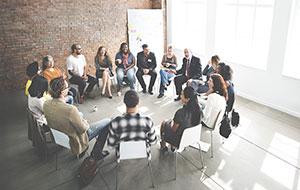Five Ways to Enhance the Onboarding Experience for Student Affairs Professionals

This blog post was contributed by Stephanie Hoffmann, assistant director of community standards and responsibility at Rollins College.
Ensuring that student affairs professionals feel engaged with their institution, know what resources are available on and off campus and know how they can utilize their strengths can help them perform better in their roles and positively influence the academic lives of students.
Over the past six years, Rollins College has reworked its onboarding experience for student affairs staff. The new format has helped prevent burnout, helped staff feel more connected to the mission of the institution and more knowledgeable of professional development opportunities, and feel supported by their supervisors or colleagues.
Here are five ways we have transformed onboarding for student affairs staff at Rollins that you can apply at your institution:
- Invite institution leaders to engage with new staff. We kick off orientation with a breakfast where Rollins’ vice president for student affairs and the dean of students meet with new staff. This helps set the tone for orientation as they discuss the importance of the student affairs role and how the department contributes to student success.
- Share the institution’s background, mission and traditions. Student affairs staff need to feel connected to the institution. This is accomplished by sharing the mission, vision, traditions and curriculum. This session is also the time to teach new staff about institution type (public, private, liberal arts), and review the academic catalog and registration process. Here at Rollins, we have received positive feedback from new staff members who have said they found it beneficial to learn about the academic side of the house so that when students come to them with questions they can respond.
- Teach a crash course on student development theories. While many student affairs professionals have taken student development theory, some new staff may not have a background in student affairs. Introduce student development theories and frameworks that can help provide insight on student behavior and how to best support them. If there isn’t a student development theory course at your institution, utilize current student affairs staff, a counselor or a psychology professor who specializes in student behavior.
- Help new staff learn about their work styles through personality assessments. Personality assessments like Myers Briggs, Gallup’s StrengthsQuest or DiSC help staff learn about their strengths and how to best use them in their role. Provide participants access to the assessment and ask them to bring their results to onboarding. Facilitators can lead discussions on leadership styles, and staff can then take this information back to their supervisors. Don’t forget to highlight professional development opportunities at your institution such as conferences, certificate programs, tuition remission, field studies, and immersion or study-abroad programs that can help build upon the strengths identified in the assessment.
- Initiate face-to-face time with campus partners. This will be an opportunity for new staff to meet those who work closely with student affairs staff and begin building their campus network. At Rollins, we invite a panel of assistant vice presidents over Rollins’ three student affairs alignments as well as representatives from the wellness center and campus safety office. New staff should know who to reach out to outside their department when necessary.
Consider these ideas to engage new staff from the get-go and teach them the importance of their role at the institution. By connecting new staff with campus leaders, departments and professional development resources, you can plant the first seeds of engagement for institutions they serve.
Related resources:
Making the Case for Tailored Onboarding for Student Affairs Professionals (CUPA-HR members-only resource)
Staff Training Toolkit (CUPA-HR members-only resource)
Orientation/Onboarding Toolkit (CUPA-HR members-only resource)


